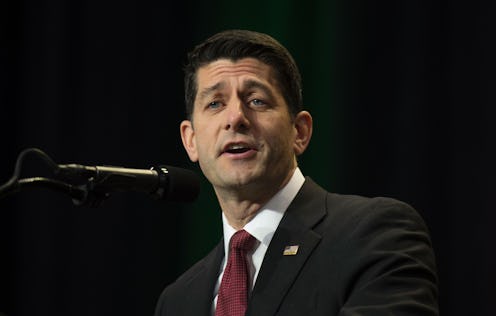News
Could Paul Ryan Become Acting President?

Donald Trump will assume the presidency on January 20th. If at any point he's unable to continue serving in that capacity, incoming vice president Mike Pence will assume the presidency. But what if something were to happen to Pence? Could Paul Ryan become acting president under the Presidential Succession Act?
He sure could. As you probably know, the vice president ascends to the presidency in case the president resigns, dies, gets impeached or otherwise can't serve. But if there is no vice president available to do this — if the office is empty, for instance — then the Speaker of the House becomes acting president. And as of this writing, Ryan is the speaker.
Such a situation has never arisen, but it's not as inconceivable as it might seem. The vice presidency was vacant for four years under Harry Truman, for instance; had something happened to Truman during that time, the Speaker would have become acting president. Similarly, if Richard Nixon had resigned just eight months before he did, then-Speaker of the House Carl Albert would have assumed the role of acting president, as there was no vice president for two months in 1973.
All of this is thanks to the Presidential Succession Act, initially adopted in 1792 and updated periodically since then. Initially, it was not the House Speaker but the Senate president pro tempore — that is, the longest-serving U.S. senator — who became acting president if the president and vice president couldn't serve. The Speaker of the House was next in line.
The act was modified in 1886 to remove both the Senate president pro tempore and the House Speaker from the line of Succession. They were replaced instead by the heads of various government agencies. Many took issue with this, however, given that agency heads are unelected political appointees.
So, at the urging of President Truman, the act was reverted back to its original form in 1947, but with one change: In the newest iteration, the Speaker of the House, not Senate president pro tempore, was first in line to become acting president should anything happen to the president and vice president.
This leaves one question unanswered, however: What exactly does "acting president" mean? Do they serve as president for the remainder of the former president's term, or only temporarily? The text of the law suggests that it's the former — but there's some vague language in there that could conceivably result in a Constitutional crisis, should the provision ever be put to the test.
Thankfully, it never has been put to the test. While vice presidents have been called upon to assume the presidency, the U.S. has never been faced with a situation wherein both the president and vice president were unable to serve. Hopefully, it never will.